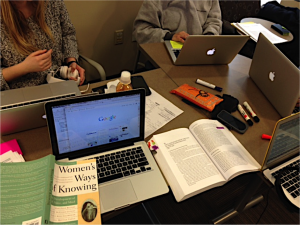Feminist pedagogy is rooted in specific epistemological frameworks, or conceptions of knowledge. It critiques traditional notions of learning and knowing and offers an alternative epistemological framework that acknowledges the inherent connection between power and knowledge (Chick and Hassel).

In 1986’s Women’s Ways of Knowing, Mary Field Belenky, Blythe McVicker Clinchy, Nancy Rule Goldberger, and Jill Mattuck Tarule respond to the research of William Perry. His model of epistemological development is widely used to understand how college students think of authority, knowledge, and truth–even though his original findings were drawn from a limited sample in his study of 100 Harvard men. WWoK expands what they saw as an inappropriately universalized trajectory in Perry by studying 135 women in a variety of contexts (3). They found that, while the women in their research valued the academic work traditionally framed by masculine and rational disciplines, they also valued what they learn outside of the academy, such as in friendships, relations with teachers, life crises, communities, and elsewhere (4-6).

This is a sample of our workspaces during the composition of the guide. For more information, check out the "about this guide" section.
In addition, the in-depth interviews revealed the frequent metaphor of “voice” to represent their experiences, pointing to “a[n intricately intertwined] sense of voice, mind, and self” (18).
Despite the suggestion in their book title that all women share a collection of essential, inherent mindsets, this research troubles the simple hierarchy that characterizes ways of knowing traditionally labelled “feminine” as irrational, unreliable, irrelevant, and inferior.
